Croatian Fraternal Union-National Federation of Croatian Americans to Host Special Olympics Fundraiser, May 31st!
Please let me share with you all that we have scheduled a special music and wine tasting event on Friday, May 31st to benefit the wonderful Special Olympics organization in Croatia. The welcoming reception for the National Federation of Croatian Americans Cultural Foundation (NFCA) and co-hosted by the Croatian Fraternal Union (CFU) is set for 6:30 to 8:30 pm at the CFU Headquarters in Monroeville, Pennsylvania and will feature beautiful Croatian music and Croatian wines, including Posip, Grasevina, Malvazija, and Plavac Mali. Also, we will taste and savor one case of the world class and world famous Grgich Hills Chardonnay, donated by Miljenko Grgich, the "King of Chardonnay".
Founded in 1992, the Special Olympics in Croatia has forty affiliated chapters all over the country, and brings sixteen official sports to over 1,300 Croatians. The organization’s mission is to provide year–round sports training and athletic competition in a variety of Olympic–type sports for children and adults with intellectual disabilities, giving them continuing opportunities to develop physical fitness, demonstrate courage, experience joy, and participate in the sharing of gifts, skills, and friendship. Competing in international events, Special Olympic athletes from Croatia have travelled all over the world—to countries such as China, Japan, Greece, South Korea, Austria, and the U.S. Most recently, the Croatian team competed in Abu Dhabi for the 2019 Special Olympics World Summer Games where they proudly took home 3 gold and 7 silver medals. I was extremely pleased and it was my personal thrill to spend five days with Croatia's Special Olympics delegation in Los Angeles, California for the 2015 Summer World games.
The Croatia's Special Olympics organization has been led by Executive Director, Franjo Horvat and associate Sladjana Tatic for over twenty years and the work they do, to arrange sporting events for Croatians with intellectual disabilities is simply amazing, The NFCA is very proud to be a major sponsor and partner with this truly incredible organization. It's my honor and pleasure to join Franjo Horvat and many other special friends for the 6th Annual Joseph Rukavina Special Olympics Floorball tournament on Friday June 14th, to be held in Gospic, in Lika where all my Rukavina relatives originate from!
We are lucky to have the popular Croatian singer Tommi Mischell performing, as well as Dario & Tamburaši on May 31st. Tommi Mischell is a Philadelphia based singer-songwriter, as well as an international recording artist signed for the major record company Croatia records. In her homeland country of Croatia, Tommi is known by a famous duet with Croatian tenor Vinko Coce entitled, “Da je meni s tobom kroz Pasike” which after being performed at the Splitski Festival in 1992, created overnight success for Tommi and Vinko. During the war in her homeland of Croatia, Tommi performed hundreds of humanitarian concerts to raise money for children left without parents, families affected by the war, and the reconstruction of churches throughout Croatia and Bosnia.

In 1997, Tommi relocated from Europe to the U.S. where she collaborated with the famous Sigma sound studios in Philadelphia. Her soulful voice with underlined emotional dynamic allows her to master different music styles, ranging from French chanson and theater to jazz and pop. Since coming to the United States, Tommi Mischell and her family continue to engage in many projects supporting Croatia and the Croatian-American community.
Hailing from Western Pennsylvania, Dario & Tamburaši are a musical group fronted by Dario Barišić, with band members Brock Belich, Ben Wagner, John Huckle, and Mark Stafura. They play a wide variety of music from Eastern Europe and mainly focus on music from Croatia and Bosnia and Herzegovina. From traditional bećar songs to modern pop, and love ballads to furious instrumentals, Dario & Tamburaši will truly entertain you and lift your spirits for a good cause.
Tickets for this event are available for $40 per person, $75 per couple, and $100 for families, with all proceeds benefiting the Special Olympics organization in Croatia. All attendees can pay at the door with cash or checks made out to the NFCA CF. There will be light fare served for dinner—including appetizers, pasta, pizza, cheese, crackers, soft drinks, and dessert, besides the fine Croatian wine. For any questions and to RSVP, please contact Anna Maria Sičenica at: This email address is being protected from spambots. You need JavaScript enabled to view it..
For a bit of history about the Special Olympics, Eunice Kennedy Shriver, daughter of the Joseph P. and Rose Fitzgerald Kennedy, founded the Special Olympics in 1968. As a child, Eunice witnessed her sister, Rosemary, grow up with an intellectual disability. This experience spurred her life-long passion to fight against the marginalization of individuals similar to her sister’s. Eunice’s passion took form during her time at college when, as a collegiate athlete, she saw that sports could serve to unite people from all different walks of life. Thus, her idea for the Special Olympics came from her deep love for helping people with disabilities achieve the justice, rights, and the recognition they deserve. Today, Eunice Kennedy Shriver’s passion lives on, as the Special Olympics has grown into a successful worldwide organization with over 150 countries participating, including Croatia.
The following day, the National Federation of Croatian Americans will be holding its Annual Assembly of Delegates meeting with a private Board of Directors and Delegates session from 9:00 am to 1:30 pm on Saturday, June 1st at the CFU national headquarters. For local Croatian Americans in the Pittsburgh area, you are invited and there will be a 1:30 to 4:00 pm public session with many distinguished guest speakers.
Mark your calendars and the event again is 6:30 pm to 8:30 pm and you live anywhere near Pittsburgh, you don’t want to miss this outstanding Croatian special musical event and fundraiser on Friday, May 31st.
More Croatian diaspora news can be found in the dedicated section.
Successful Diaspora Returnee Stories: Maria Mustapic, Brasserie on 7, Split
The 2nd International Conference on Diaspora Tourism opens in Split on May 17, 2019. In the build-up to the conference, TCN meets some of the returning diaspora who have made a success of life in Croatia. We start with one of our favourite stories, Maria Mustapic in Split.
With so many young people emigrating from Croatia due to lack of opportunity, there are a number of the Croatian diaspora looking to move in the opposite direction and return to the Homeland. Few actually make the move, for a variety of reasons: the uncertainty of what awaits, lack of much available information of the realities of the process and experiences, and a reluctance to move from successful Western economies to the struggling Croatian economy.
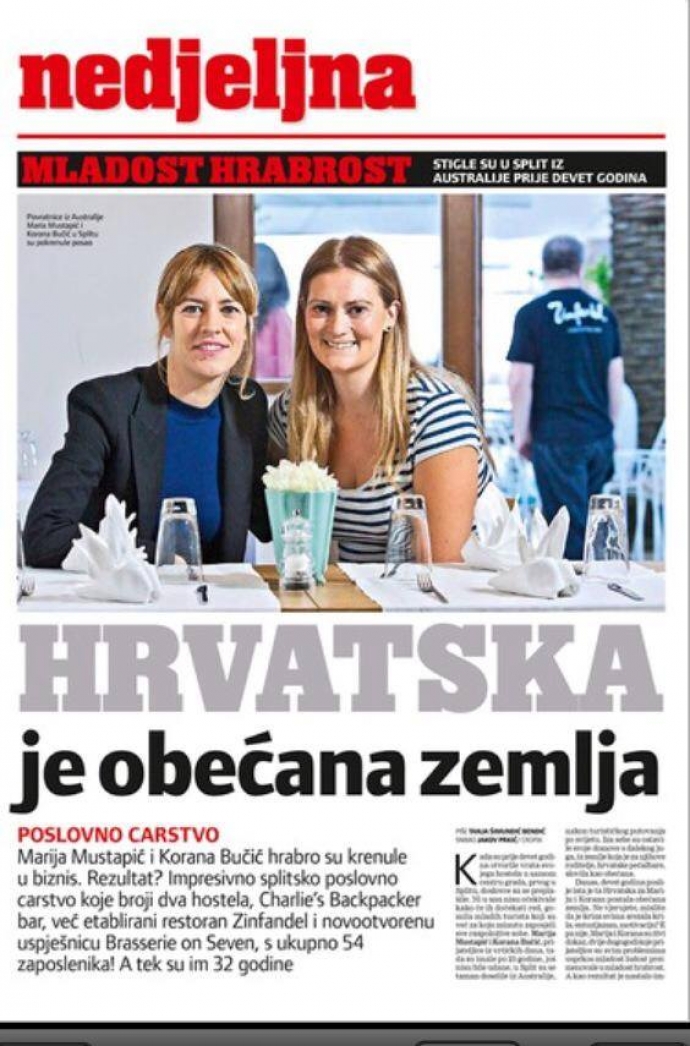
But there are many who have made the leap, some with considerable success. One of the themes of next week's 2nd International Conference of Diaspora Tourism in Split will be a focus on those success stories. By sharing experiences and bringing concrete examples of success, the conference will showcase what is possible, hopefully inspiring others to try their luck.
Croatia desperately needs to engage with its diaspora, and there are signs that this is happening. A new generation of Croatian entrepreneur and business-minded diaspora network are connecting as never before, forging links directly, with minimal contact with the State.
In order to support these positive waves, TCN will be conducting a few interviews over the next couple of weeks with speakers at the conference, hearing their stories and experiences, lessons learned and advice for those who are thinking of returning.

We begin with one half of perhaps my favourite success story of all. Maria Mastupic and her childhood friend, Korana Bucic, moved from Sydney to Split about the same time as I did back in 2004. Although it was years before we met, their reputation preceded them, and they quickly became the legendary Australian girls who opened a hostel in Split, and then just kept on going. They did a GREAT interview with TCN a few years ago on their journey - well worth a read - and Maria was kind enough to agree to an interview ahead of her speaking at next week's conference (full programme details here).
1. Born in Australia, returned to Croatia, something that many diaspora dream of doing. Tell us briefly about your journey.
The journey has been a rollercoaster, so much growth, a huge learning curve, and a lot of patience and perseverance. In 2004 we did a Euro trip with a group of friends and realised the lack of hostel accommodation so thought, this something we could do. We went back to Australia, did our research, a business plan and figured out a way to make it happen. We arrived in 2006. Once we were established we realised the opportunity for so many more business ventures and one thing led to the next. In 2008 we opened a little health orientated fast food called ‘Fab Food’, but that was way ahead of its time. So we closed that after 2 years and in 2010 opened the second hostel along with a backpacker bar ‘Charlie’s’. By 2013, having lived in Split now for 7years we were fed up with ‘lack of dining scene’ and repetitious menus and decided to try our luck in the gastronomy business. That resulted in the creation of Zinfandel food and wine bar and Brasserie on 7 in 2014. Overall, the journey has been great and thankfully well worth it.
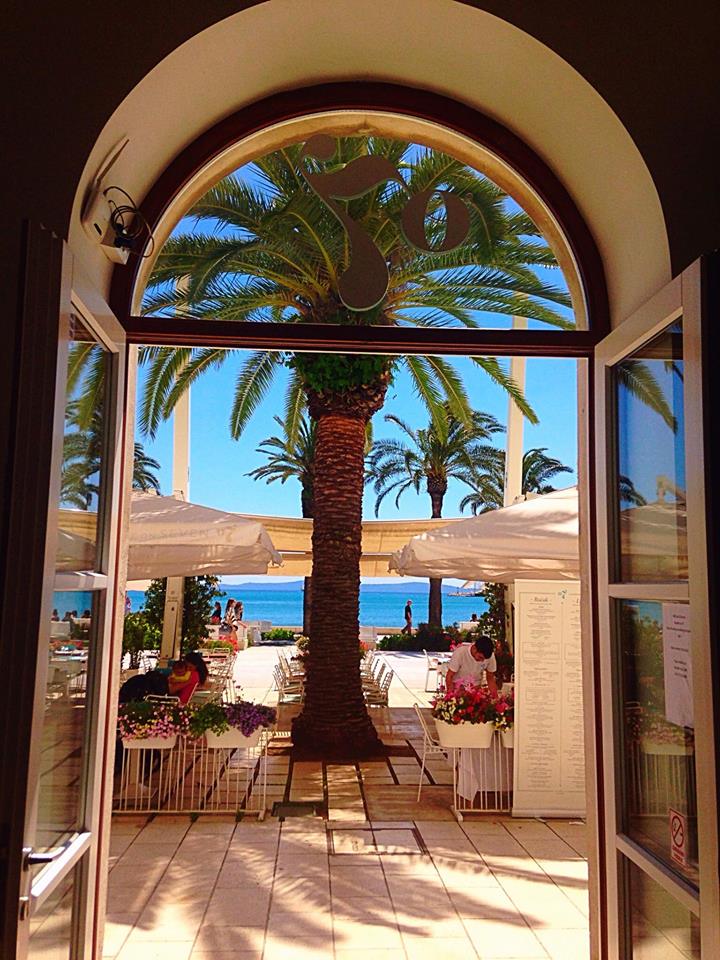
(Brasserie on 7, the best dining address on the Split Riva)
2. Looking back, what were your hopes, expectations and fears about moving to Croatia?
The upside was we were 22 when we moved to Split, but nevertheless, we had a plan and were determined to achieve it. However we didn't have much expectation, nor did we have ANY idea of what we were getting ourselves into. At 22 it was about seizing the day. Worst case scenario we move back to Sydney, split the debt and pay it back. We kept things simple, relied on each other and didn't give up. We were young and weren't so fussed or stressed about the bigger picture or financial gain in the beginning. It was an adventure. The fears were, leaving our comfort zone, having no friends, not being familiar with barely anything, the language barrier and I guess failing certainly would have been a fear as well.
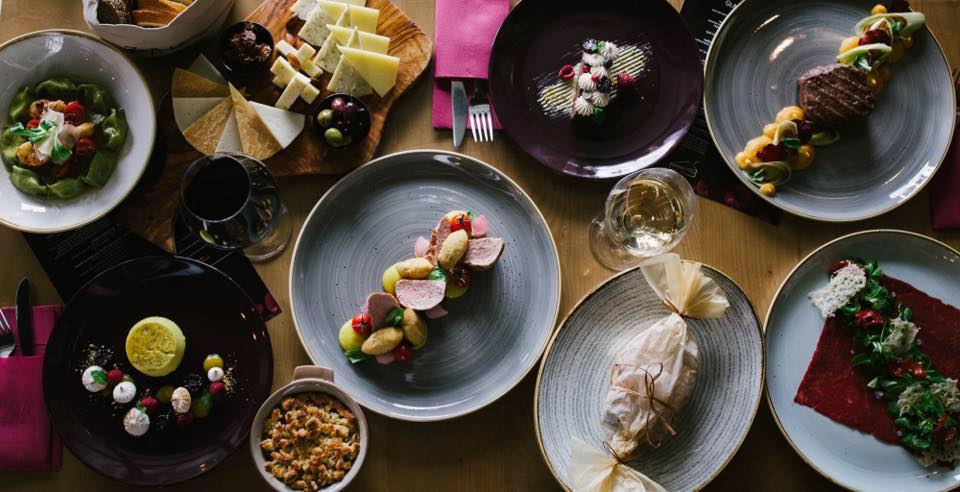
3. How supportive was your Croatian community back home at the time?
We didn't tell a lot of people, we didn't know if it was going to be permanent, or what would come of it. Our immediate family and friends obviously knew, they were extremely supportive, very surprised and thought it was gutsy, but supported us 100%! A few people made comments that we would be back before we knew it but I don't think anyone took it too seriously in the beginning.

(Zinfandel Food and Wine Bar was ground-breaking for Split when it opened in early 2013)
4. What were the main differences in what you expected to find in Croatia and the reality of living in Croatia?
The main differences were, the high’s and lows of seasonal changes, the lack of empathy, openness and assistance from the government sector. And the installment of fear that the locals were paralysed by. The pessimism and negativity is part of the culture, I can also now more so understand why. But thankfully as I mentioned being 22, the expectation was limited. For us, it was riding out the European summer dream and turning it into our lives and the hostel was the perfect way to achieve that. We were semi-aware of the stagnation of the country and the economic situation. But on a micro scale, for us, business was booming and were having a lot of fun doing it.
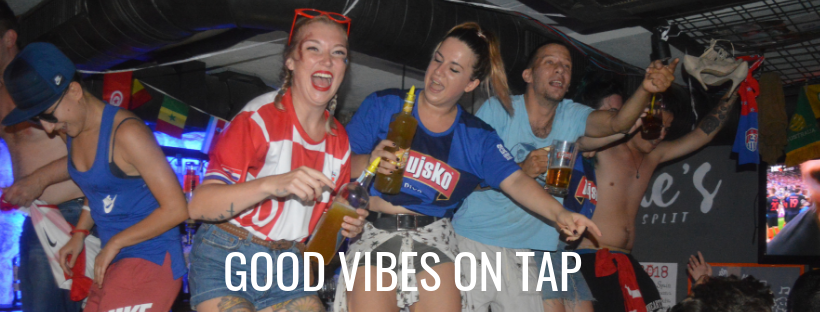
(Charlie's Bar has become an institution in Diocletian's Palace)
4. Many diaspora think of returning but few do. In truth, there is little information out there about real-life stories and help/info about the process. What advice do you have for those who are thinking about making the move?
Be prepared with daily frustrations, solitude, things you take for granted, its a great lifestyle for pensioners and young families who want a slower pace, as long as the family can financially survive. Personally, I think you need to have a plan, as many doors won't open up to you just like that. If you are moving to Zagreb then I'm assuming you can find a professional job with decent pay and create a stable new life. And maybe even change jobs once in a while. But in Dalmatia, the professional workforce is very limited. You also need to be patient, it took me a very long time to understand how everything works here. Persistence and perseverance.
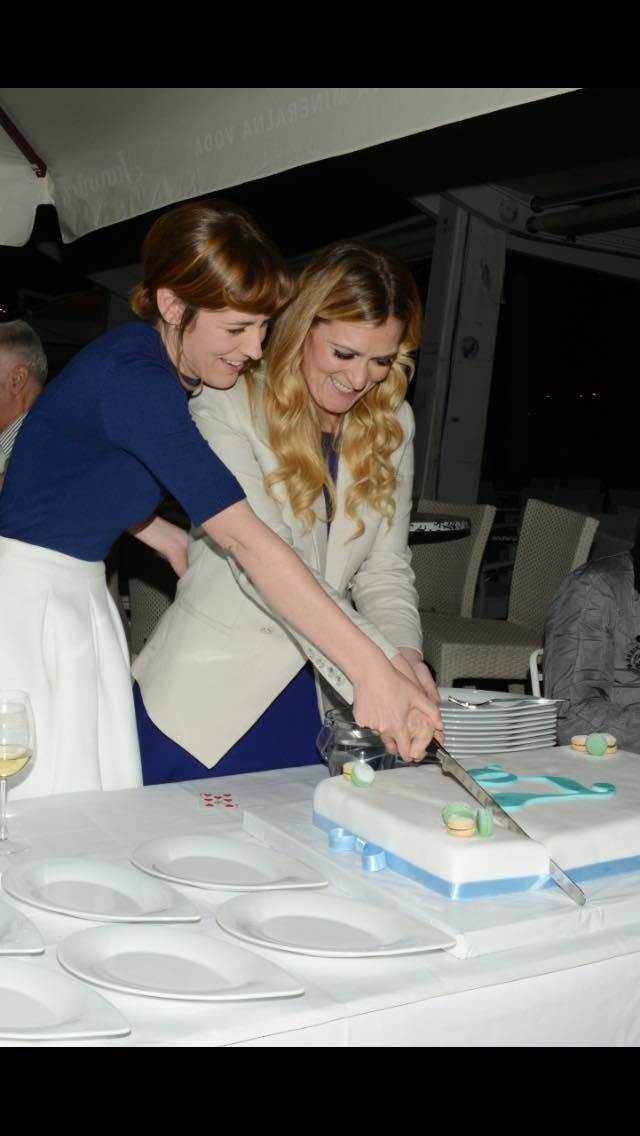
(The opening night of Brasserie on 7 in 2014)
5. How were you perceived in Split as foreigners/diaspora moving back - was the welcome warm?
Everyone was confused as to why we came and didn't understand our business model. Most government officials and offices were a nightmare to deal with, but the locals were quite warming and helpful. I think they were Genuinely concerned for us, especially as we were without our immediate family and feared our failure.
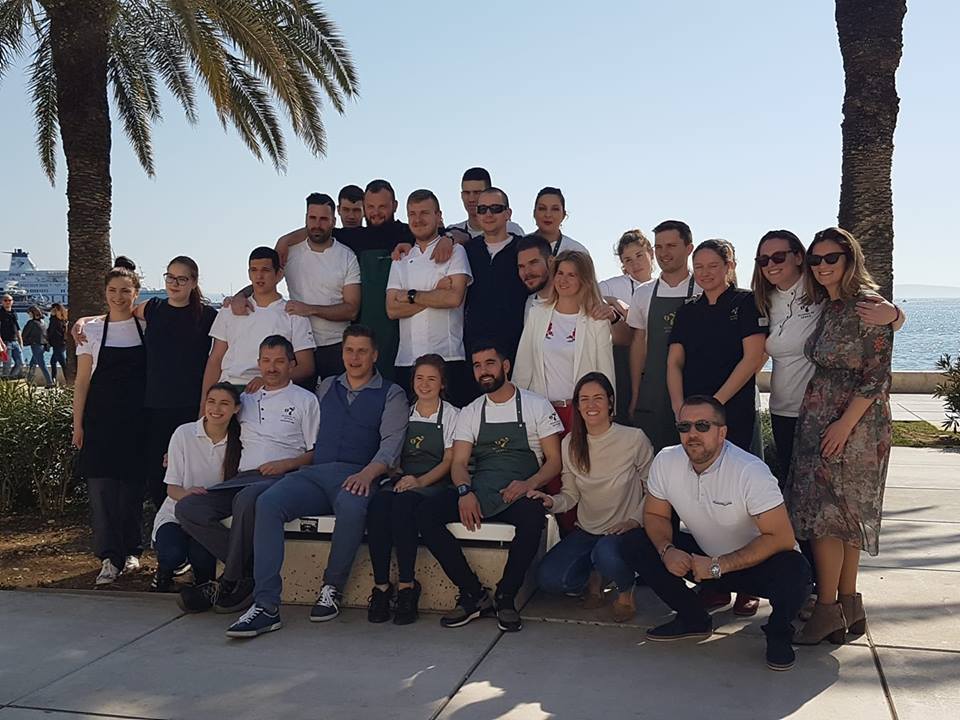
(The B7 team celebrate 5 years in 2019)
6. Through a lot of hard work, you two young ladies have been very successful, while many foreigners have given up and left Croatia. What are the keys to success in doing business in Croatia in your opinion?
Unfortunately, I believe the Golden rule is that your business is relying on and selling to a foreign market! And it is about finding the right team. Finding people that believe in the project and the company.
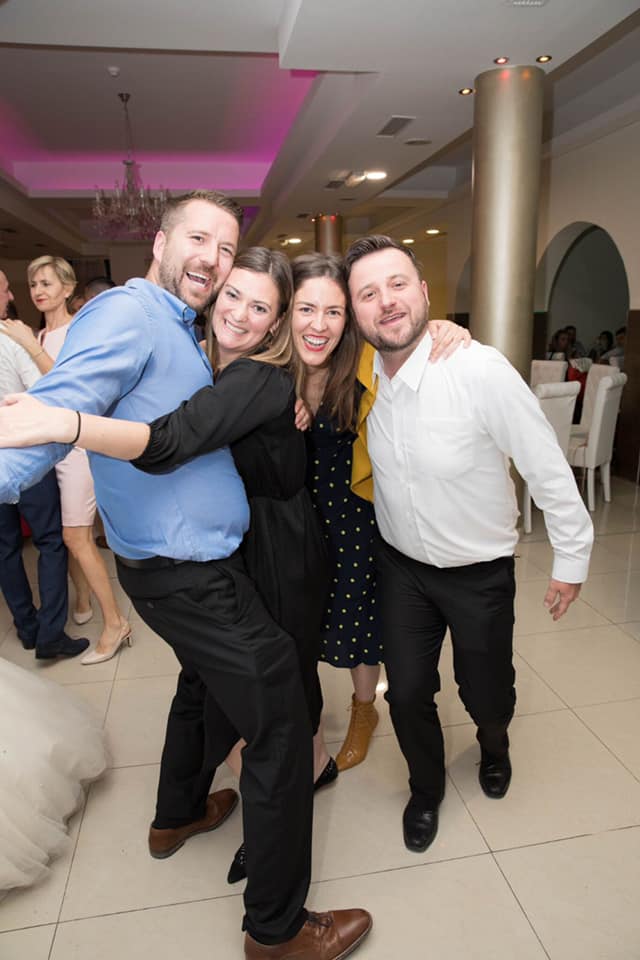
(They even managed to pick up a couple of Croatian husbands along the way)
7. What is the diaspora community like in Split and how integrated is it with locals?
It is basically a large expat community and then within that group are those with Croatian roots. But there is no diaspora group per se, as far as I am aware. We ourselves are extremely integrated with locals as they make up 99% of our company, and from what I can see there are strong ties to the community amongst others as well.

(Maria with some of the stars of the B7 team)
8. And finally, a word on this conference. What are you hoping to get out of it?
Firstly, I and Korana are relatively new mums, so our social calendar is almost obsolete. We are looking forward to meeting some new faces and maybe hopefully getting insight into different perspectives from others.
Visit the B7 website to learn more about this great dining experience, which started 15 years ago with a couple of Aussie backpackers wondering if they could make it in Croatia.
For more details on the conference, here is the full programme in English and Croatian.
2nd Croatian Diaspora Tourism Conference: Full Programme in English/Croatian
May 9, 2019 - The 2nd International Conference on Diaspora Tourism takes place in Split next week, from May 17-19. The full programme is below, in English and Croatian.








Tickets Now Available for Largest Croatian American Professional Conference in North America
Association of Croatian American Professionals host four-day event in Cleveland, Ohio to Rock Croatian Excellence
CLEVELAND, MAY 6, 2019 – The Association of Croatian American Professionals (ACAP) is hosting their fourth annual conference in Cleveland, Ohio from Sept. 19 to 22, 2019. The ACAP conference will bring together professionals from all facets of the U.S. and international professional community—such as diplomats, scientists, artists, engineers, medical professionals, attorneys, journalists, business executives, social media specialists, accountants, as well as a delegation from Croatia’s Chamber of Commerce.
Tomislav Mihaljevic, MD, Cleveland Clinic CEO and President, has committed to be a featured speaker.
“ACAP conferences bring together a vast array of professionals of Croatian descent. It’s amazing to see all of the innovative individuals with Croatian roots get together to educate one another, share ideas, network and make new friends,” says Marko Zoretic, President, ACAP.
The conference commences with a welcome event the evening of Thursday, Sept. 19 at the American-Croatian Lodge in Eastlake, Ohio, the heart of the Cleveland Croatian community since 1984. The day-long conference and evening gala and award dinner will take place on Friday, Sept. 20 at the Cleveland Marriott Downtown at Key Tower. The remainder of the conference activities—meetings, business spotlights, sightseeing and social activities—will take place in downtown Cleveland.
Sightseeing activities include: tours of the Cleveland Museum of Art, Rock and Roll Hall of Fame and local craft breweries. A fundraiser in conjunction with the National Federation for Croatian American Cultural Foundation (NFCA), to benefit the Croatian Special Olympics, is planned for Saturday, Sept. 21.
The conference theme is Rocking Croatian Excellence — a play on Cleveland being the home of the Rock and Roll Hall of Fame and ACAP’s social media hashtag #CroatianExcellence.
“We look forward to the hosting the fourth ACAP conference in Cleveland where we’ll show the world how much Croatians and Cleveland rock,” says Biljana Lovrinovic, President, ACAP–Cleveland.
To purchase your tickets or for more information, please visit conference.croampro.com.
Association of Croatian American Professionals (ACAP)
The Association of Croatian American Professionals is a non-profit organization bringing together professionals, business leaders, academics, students and community organizers. Their mission is to foster leadership, collaboration and to promote the advancement of issues relevant to the Croatian-American community. In four years, ACAP has expanded to 12 chapters, including Cleveland, in the United States and Croatia with 750 members, and growing, worldwide. Visit croampro.com for more information.
A Wind of Change in Croatian Diaspora Relations: Entrepreneurs Looking Forward
May 1, 2019 - The relationship between Croatia and its diaspora has always been complex, but a new positive wind of change will be on display at the 2nd International Conference on Diaspora Tourism.
One of the most fascinating relationships in this very complex land is that between Croatia and its diaspora, a relationship which is more complicated than most longterm relationships.
It is also multi-faceted, with four main waves of emigration over the last 200 years to all corners of the globe. The reasons for each wave varied from economic to political persecution to war to economic. As such, the experiences of the diaspora and the individual relationships of members of the diaspora is very different. Those who are second or third generation descendants of Croats who moved to Australia due to persecution from Tito, for example, will have grown up in Croatian Australian communities with a very different outlook on the homeland than those who are descendants of economic migrants after the devastating phylloxera in the late 19th century now in Cleveland, Ohio. You can learn more about the waves of Croatian emigration and where the Croatian diaspora is located in the Total Croatia intro to the Croatian diaspora.
But the diaspora all have one thing in common - a burning love of the homeland and a very strong patriotism.
And even though they pay no taxes but have the vote, the diaspora certainly put their hand in their pockets, with diaspora remittances of 2 billion euro exceeding the total foreign investment into Croatia in 2018. Every statistic tells a story.
They certainly put their hands in their pockets during the Homeland War, as well as immediately afterwards, pouring investment cash into the newly independent Croatia. Unfortunately, the mighty State of Uhljebistan was formed at the same time, a State which continues today within Croatia. Money was siphoned off, projects never happened, a small number in power got very rich.
Just one more layer of complexity to add to the diaspora relationship to the Homeland.
But the love for the Homeland was as strong as ever.
I was a speaker at the 3rd Croatian Diaspora Congress last year (you can see my speech below). It was a fascinating event, and at times I felt like an intruder as a non-Croat, especially during the emotional visit to the Vukovar Hospital Museum.
One of the most fascinating dynamics of the conference was observing the older diaspora generation, many of whom had experienced emigration at first hand, and the new generation entrepreneur, both diaspora and those living in Croatia.
There was a vibrancy and positivity and looking to the future that I found very exciting in this younger generation. The bonding and remembering of the past is, of course, an essential part of any diaspora gathering. But so too, at least in my opinion, these conferences should be used as opportunities to network and strengthen business bonds between the two.
There were elements of that in Osijek, a lot more of that at the excellent G.2 conference in Zagreb, but I think the best diaspora conference so far, in terms of looking ahead, is coming to Split in a couple of weeks. Looking at the lineup of panels and speakers, the 2nd International Conference on Diaspora Tourism, is set to bring together a global force of positivity and entrepreneurship, which could do wonders for a new relationship between the younger generation diaspora and Croatia's successful entrepreneurs.
Minutes after I published the event announcement a few weeks ago, I received a message from a TCN reader in South Africa asking if I thought it was worth attending, as it was an expensive trip from Cape Town. Yes, I replied, without hesitation. A similar question from an Australian Croatian friend living in Dalmatia, who has traditionally been wary of these gatherings. She will always be there.
A crucial difference in the organisation of this conference is that most of the organisers come from successful business backgrounds, and while all are proud patriots and remember the past, they also see the economic opportunity and chance to strengthen the bonds of cooperation and business, for the greater good of Croatia.
As one of the organisers and proponents of change, Ognjen Bagatin from Bagatin Clinic, often says in his presentations to the diaspora:
"We need you. You are our greatest ambassadors."
This relationship between Croatia's entrepreneurs and the business-minded diaspora is young, but very exciting. Mistakes will be made, but after the negative impressions after the investments after the Homeland War, trust is slowly building up again.
If you are an entrepreneur with a love of Croatia, this conference should be an inspiration, with plenty of first-hand experiences of success stories, as well as opportunities for collaboration. I encourage you to attend.
And, being as useless as I am, I cannot now find the conference programme, which I will link here as soon as I do.
To learn more about the conference, visit the official website.
Successful Returnee Business Women Invite Diaspora to #FromDiasporaToDiaspora Conference in Split
April 24, 2019 - Branka Ćubelić, CEO of Dreamtime Events Croatia and Stanka Karazija, Director of Brown Beach House Hotel in Trogir invite those in the diaspora to the #FromDiasporaToDiaspora Conference in Split on the 17th and 18th of May 2019.
Branka Ćubelić is a returnee from Australia and Stanka Karazija is a returnee from the U.S.A and has also lived in numerous Arab countries. Both have returned and have been using their expertise acquired in the diaspora to start their own businesses here in Croatia.
"We have come back; you should come back. You should use all of your expertise that you have gained in foreign countries, invest in Croatia, come here and teach this younger generation on how business should look like and we want you to come back!“ – Stanka Karazija.
The Overarching Goal of the Diaspora Conference is to find ways to Integrate all Croatians as one and to forge the future of the Croatian identity both in Croatia and abroad through social, economic and political solutions. Hear the stories of successful returnees who are making a difference in Croatia.
Some of the Panel Discussion include:
1. Successful stories of returnees who have invested in Croatian tourism
2. The Croatian dream
3. The past and the future of the Croatian returnees
4. Diaspora tourism & investments
5. Health & wellness tourism
6. Croatia as a brand
7. Diaspora culture shock
8. Integration into Croatian businesses
9. Croatian tourism startups
10. Pitch session – innovative Croatian companies
11. The creation of the tourism product and the cooperation among the tourist industry
12. Development niches of diaspora tourism: culture, creativity & events
BE PART OF THE CONFERENCE!
This is an opportunity to access and network with Croatians from around the world who have an affinity for Croatia’s progress. Some of the things that we will be doing along with discussing Croatia's future are:
17th of May- Lunch, at the Milesi Palace, and catering in between panels
17th of May- Dinner at Restaurant “Adriatic Grašo”
18th of May- Lunch at the Milesi Palace and Catering between panels
18th of May- Dinner at “Frapa” Marina in Rogoznica and the organized bus ride to the restaurant (Host: Franjo Pašalić)
19th of May- Lunch at the Waterman Svpetrvs Resorts, in Supetar on the Island of Brač
Ferries leave from the harbour in Split hourly. (Host: Marion Duzich)
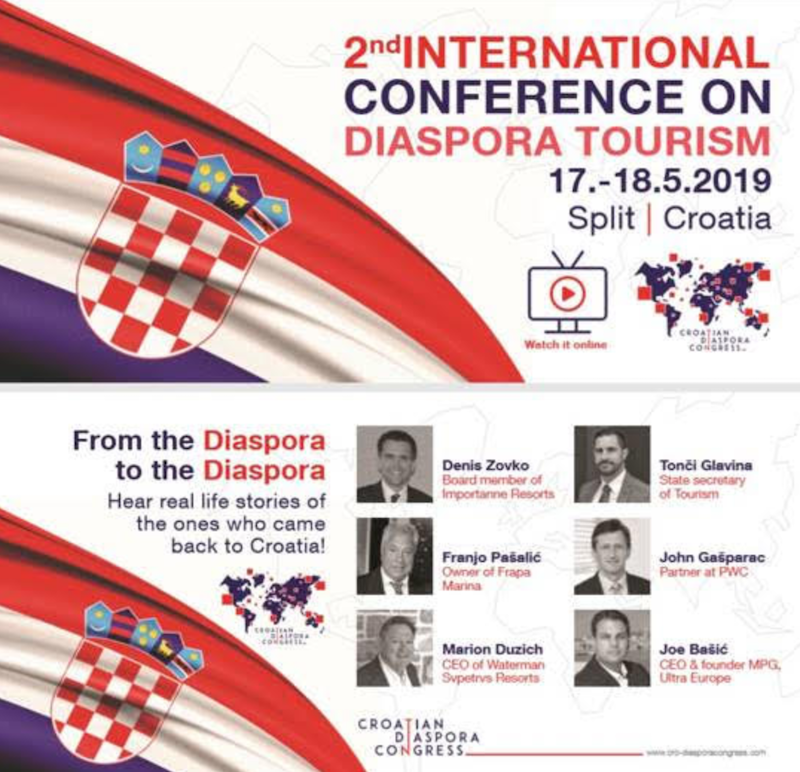
To learn more and to sign up for the Diaspora Conference, please visit us at cro-diasporacongress.com/split-svibanj-2019/
To read more about the Croatian diaspora, follow TCN's dedicated page.
Croatian Mass in Munich Disrupted by Mentally Ill Person Shouting "Allahu Akbar"
ZAGREB, April 21, 2019 - The person of African descent who disrupted Mass in St Peter's Church in the Croatian Catholic parish in Munich on Saturday evening by shouting "Allahu Akbar" and throwing stones, is mentally ill and not connected with terrorism, the Croatian Ministry of Foreign and European Affairs said on Sunday.
The man was shouting and throwing stones at the congregation and around the church, and the people fled in panic. Twenty-five Croatian nationals were slightly injured in the confusion, the ministry told Hina, adding that police said that the man did not use firecrackers as some media reported.
Croatian media at home and abroad said that it was a middle-aged man who was shouting "Allahu Akbar", which led many of the believers to think that it was a terrorist attack.
Fenix magazine, the Croatian-language news website based in Frankfurt, said that several people had managed to overpower the man and stop him on his way to the altar before the police came in force.
The Croatian ministry quoted the Munich police as saying that the incident had nothing to do with terrorism and that it was caused by a mentally ill person, who has been hospitalised after being arrested.
Police stepped up security around the churches where Mass was celebrated in Croatian, notably around St Michael's Church.
More Easter news can be found in the Lifestyle section.
An Invitation Letter to the Croatian Diaspora
April 12, 2019 - There is a new energy to strengthen links between the Homeland and the Croatian diaspora - a letter of invitation.
One of the more interesting relationships I have been covering in recent times is the increasingly interlinked relationship between Croatia and its diaspora. With now less than 4 million people living in Croatia and almost as many Croats dispersed all over the world, Croatia needs to engage more with its diaspora and encourage investments. The situation at the moment is that the diaspora sent back some 2 billion euro last year, more than foreign investment in Croatia, and the potential to build on this has got entrepreneurs both inside Croatia and in the diaspora working hard to strengthen links.
The 2nd International Conference on Diaspora Tourism will take place next month, as previously announced on TCN. The organisers have a letter of invitation, which is printed in full below.
Dear Croatian Diaspora,
In this day of age, with technology shrinking our world and making it possible for people to make an impact from anywhere, the Croatian diaspora has never been more important than now. The Contributions the Croatian diaspora have made to the Homeland are the bedrock of Croatian social, political and economic life. Keeping our culture, customs, language and history alive outside of the homeland helped to spearhead our independence and later, with the same patriotism and love for the homeland in mind, the diaspora helped to bolster Croatian tourism, making Croatia one of the most visited countries in 2018.
Croatians feel a special bond to our homeland, and many do not understand the love of their homeland until they have left her to live in another country. With patriotism, love for their country, their hard work ethic and knowledge, the Croatian diaspora is the key to Croatia’s success.
From the diaspora to the diaspora! On May 17-19th, join us as people from the diaspora discuss the next steps in developing tourism. We will discuss some of the opportunities that exist for diaspora as well as those that are in the making. The Overarching Goal of the Diaspora Conference is to find ways to Integrate all Croatians as one and to forge the future of the Croatian identity both in Croatia and abroad through social, economic and political solutions. Hear the stories of successful returnees who are making a difference in Croatia. Some of the topics that will be discussed at the Conference are:
Croatia as a brand
Diaspora Tourism & Investments
The Croatian Dream Health and Wellness
Tourism Croatian diaspora startups Pitch Session – new innovative Croatian companies
The Conference will be held in Split on Friday and Saturday while on Sunday we will be taking a ferry to Brač. If you are not able to come to the conference, panel discussions will be uploaded immediately and archived on our youtube channel.
Come to Split, Watch Online, Engage in the national conversation surrounding tourism, business but most importantly the diaspora and the integral role they play in the future of Croatia. The scope of this conference is to share experiences and knowledge from diaspora to the diaspora. The solutions that we advocate for today will determine the discourse and direction for the future of our Homeland.
To find out more and to Register for the Conference please visit our website at: cro-diasporacongress.com
Vidimo se/See you!
For those that are interested in participating at the Second International Conference of Diaspora Tourism, Which will take place on the 17th and 18th of May in the Milesi Palace in Split (Trg Braće Radića 3.) are asked to sign up and for the panellists to send a summary of what they are going to talk about before the 30th of April 2019. The Summary must include: the title of work, name and last name of the panellist, formal title of the panellist, the institution they are representing, and a small 200 word summary of what they will be talking about at the Conference. The panels will be in Croatian or, if requested by panellists, in English.
The registration fee is 1.500 Kunas which will go towards paying:
A welcome bag, information about the panels and other promotional materials, access to networking with Croatians from around the world who have an affinity for Croatia’s progress. It also includes other events such as the following:
17th of May- Lunch, at the Milesi Palace, and catering in between panels
17th of May- Dinner at Restaurant “Adriatic Grašo”
18th of May- Lunch at the Milesi Palace and Catering between panels
18th of May- Dinner at “Frapa” Marina in Rogoznica and the organized bus ride to the restaurant (Host: Franjo Pašalić)
19th of May- Lunch at the Waterman Svpetrvs Resorts, in Supetar on the Island of BračFerries leave from the harbour in Split hourly. (Host: Marion Duzich)
TCN will be at the event and bringing a full report. In the meantime, you can follow the latest from the Croatian diaspora in our dedicated diaspora section.
ACAP Croatian Medical Tourism Task Force Meets in Cleveland
March 30, 2019 - An important meeting for the emerging Croatian medical tourism story in the diaspora heartland of Cleveland, as the ACAP medical tourism task force meets to see how to strengthen health tourism ties with the Homeland.
As Croatia looks to advance its medical tourism story, the role of the diaspora will be crucial. As recently reported, the Croatian diaspora last year sent more back to the Homeland in remittances than Croatia welcomed in foreign investment, some 2 billion euro in total.
International experts agree that Croatia has the potential to be in the top 10 medical tourism destinations in the world in the next ten years, and while few would argue about the quality of the healthcare and service in the private sector, promotion and marketing are some way behind.
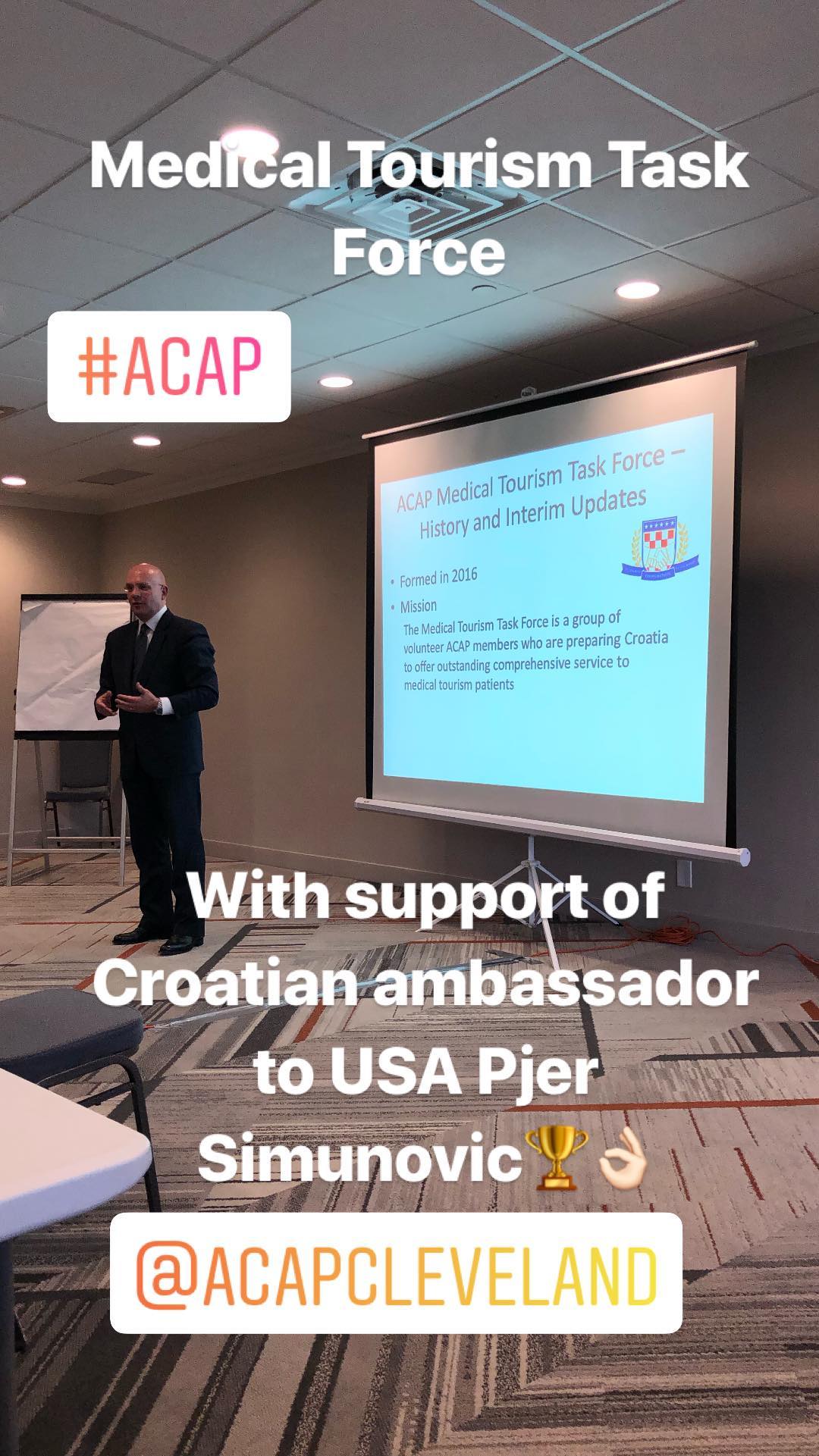
With more than 1.2 diaspora (40% of the total) in the United States alone, developing strong relationships between the diaspora in the USA and Croatia is a sensible and solid strategy. That potential partnership is especially true in Cleveland, home to 50,000 Croatians, as well as the renowned Cleveland Clinic, whose current CEO Tom Mihaljevic is Croatian.
What better location, then, for a gathering of the Association of Croatian American Professionals (ACAP) and its medical tourism task force, which met today after a successful first gathering in Washington DC last year, as reported previously by TCN.
Today's meeting included Croatian Ambassador to Washington Pjer Simunovic.
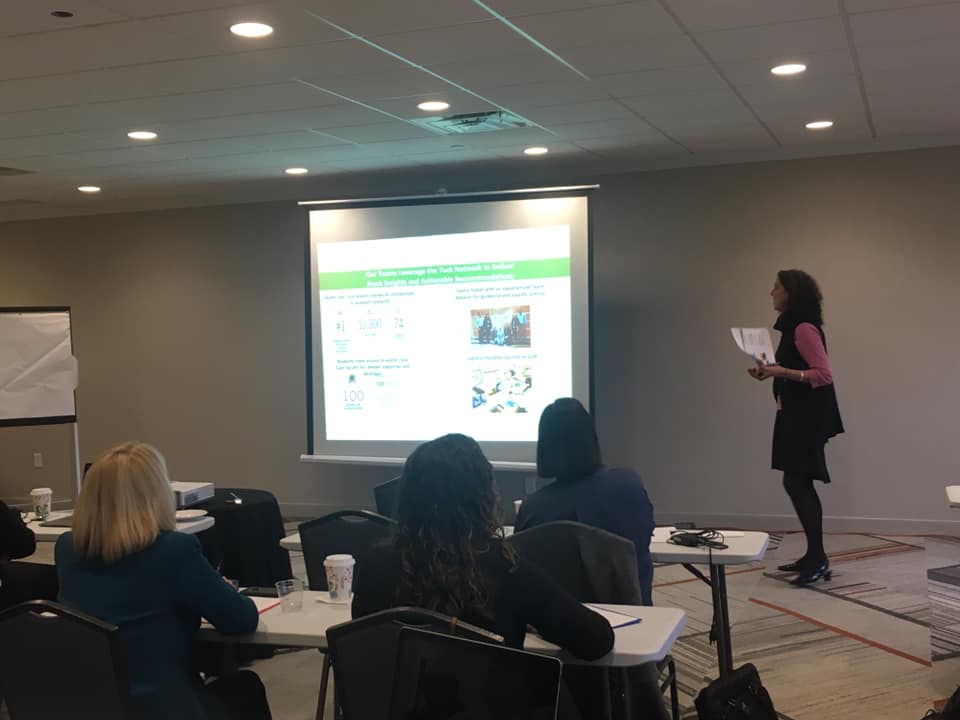
“I’m extremely excited about the possibility of having students involved with healthcare in Croatia.” Kerry Laufer, Director, Onsite Global Consulting, Tuck School of Business at Dartmouth College.
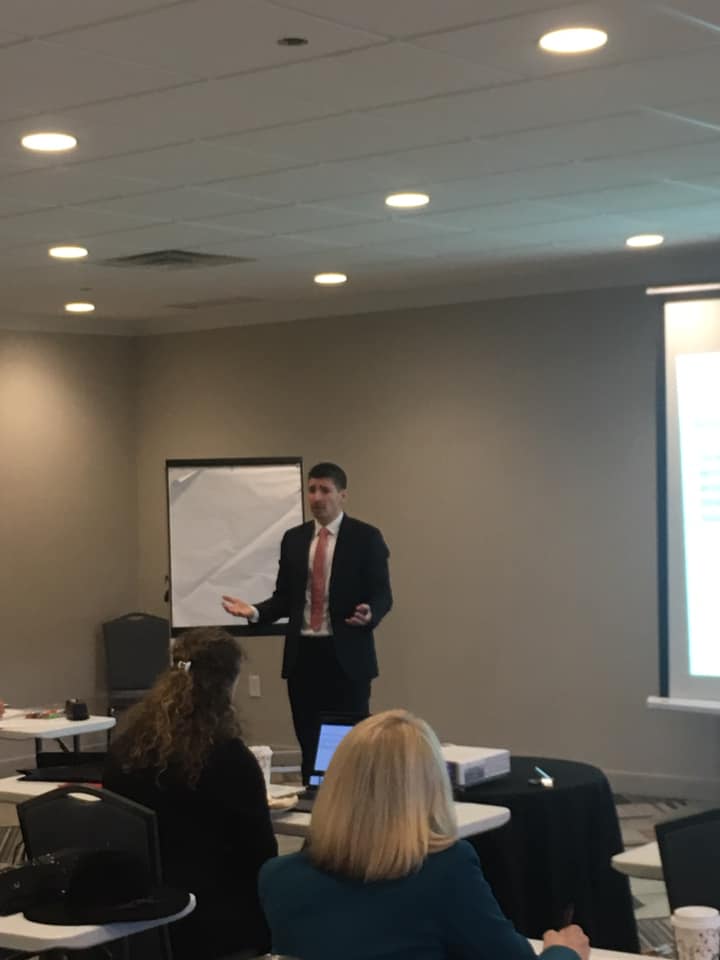
“We can learn from healthcare facilities like Cleveland Clinic. They can teach us methods to make the patient experience better.” Ognjen Bagatin, CEO, Bagatin Clinic in Croatia.
Bagatin, the most active proponent of medical tourism in Croatia on the international, was clearly pleased at the progress made, posting later on social media:
What a great day with #acap Medical Tourism Task Force in #Cleveland??? we made some great plans for an Annual meeting organize by @acapcleveland From 19th to 21st of September in Cleveland???? See you all there? #croatiandiaspora #medicaltourism #healthtourism #tie
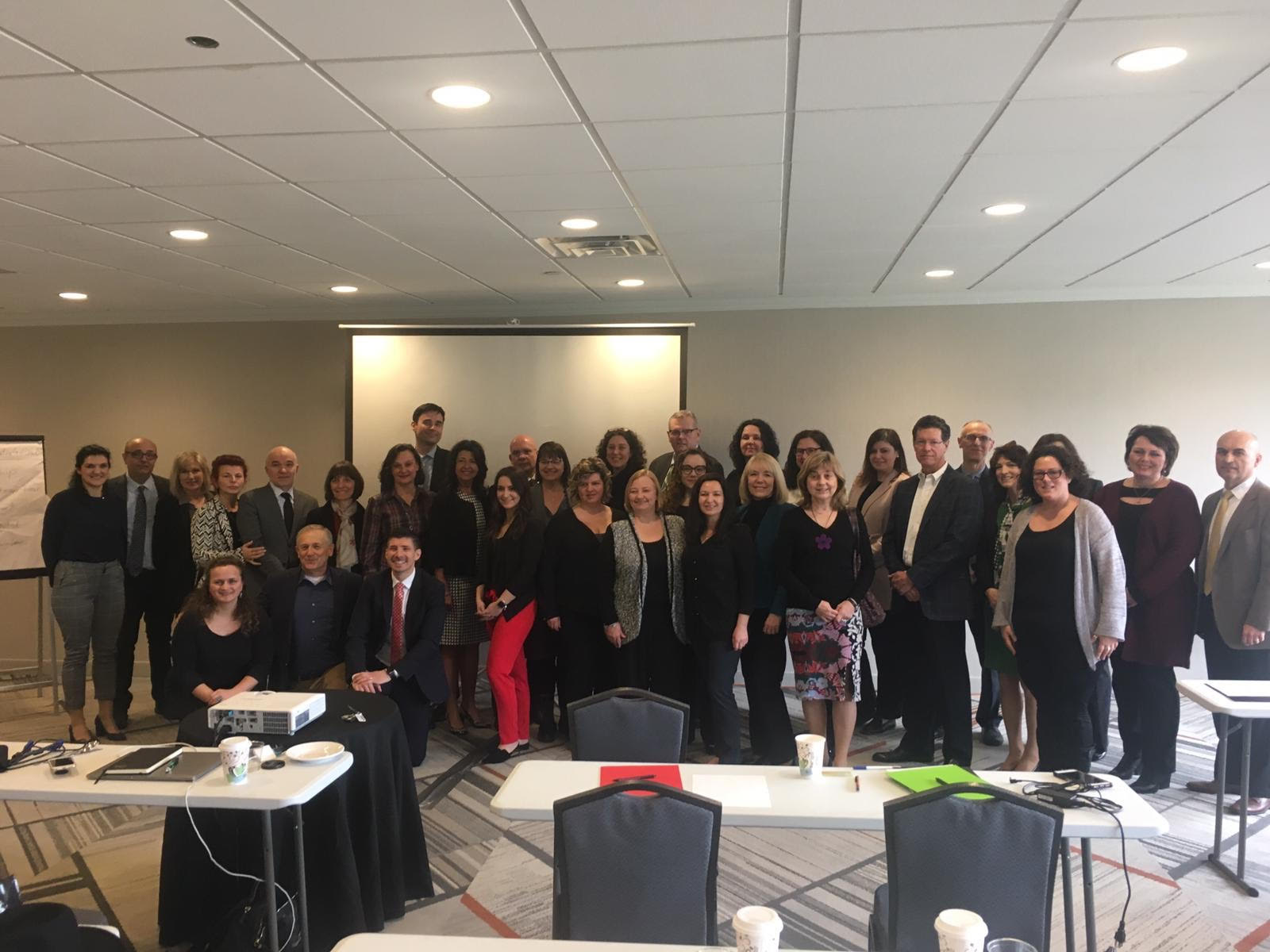
For the latest news in the Croatian medical tourism story, follow the dedicated TCN page.
Book on Emigrants from Podgora to Australia and New Zealand Presented
ZAGREB, March 28, 2019 - A book by Smiljana Šunde "Batili su ocean: U potrazi za izgubljenim Podgoranima" portraying the stories of emigrants from the coastal town of Podgora on the Makarska Riviera was launched at the Croatian Heritage Foundation (HMI) in Zagreb on Thursday.
HMI director Mijo Marić underscored that the author tells the story of locals born in Podgora of whom there are more abroad than in their home town, and describes their lives abroad and of their sense of belonging.
According to Ivan Hrstić from the Ivo Pilar Institute of Social Sciences, the book discloses the dynamics of social events in Croatia and its southern coastline at the turn of the 20th century. The author describes Croatian communities in Australia and New Zealand, Hrstić underscored.
He underscored that about 1,300 Podgora residents emigrated over a period of one hundred years and that only about 280 had returned to their hometown.
The 831-page book presents some 70 stories, many of which describe marriages at a distance, how women corresponded with men who would be their future husbands without really knowing them and how they travelled to Australia and New Zealand where they eventually met their husbands and married them.
Šunde described that Croats who emigrated to New Zealand after World War I were the first to establish ocean fishing and the local fish industry.
"Croats, including Podgora residents also established New Zealand's wine growing and were prominent in many other fields of life," Šunde said.
More diaspora news can be found in the dedicated section.



